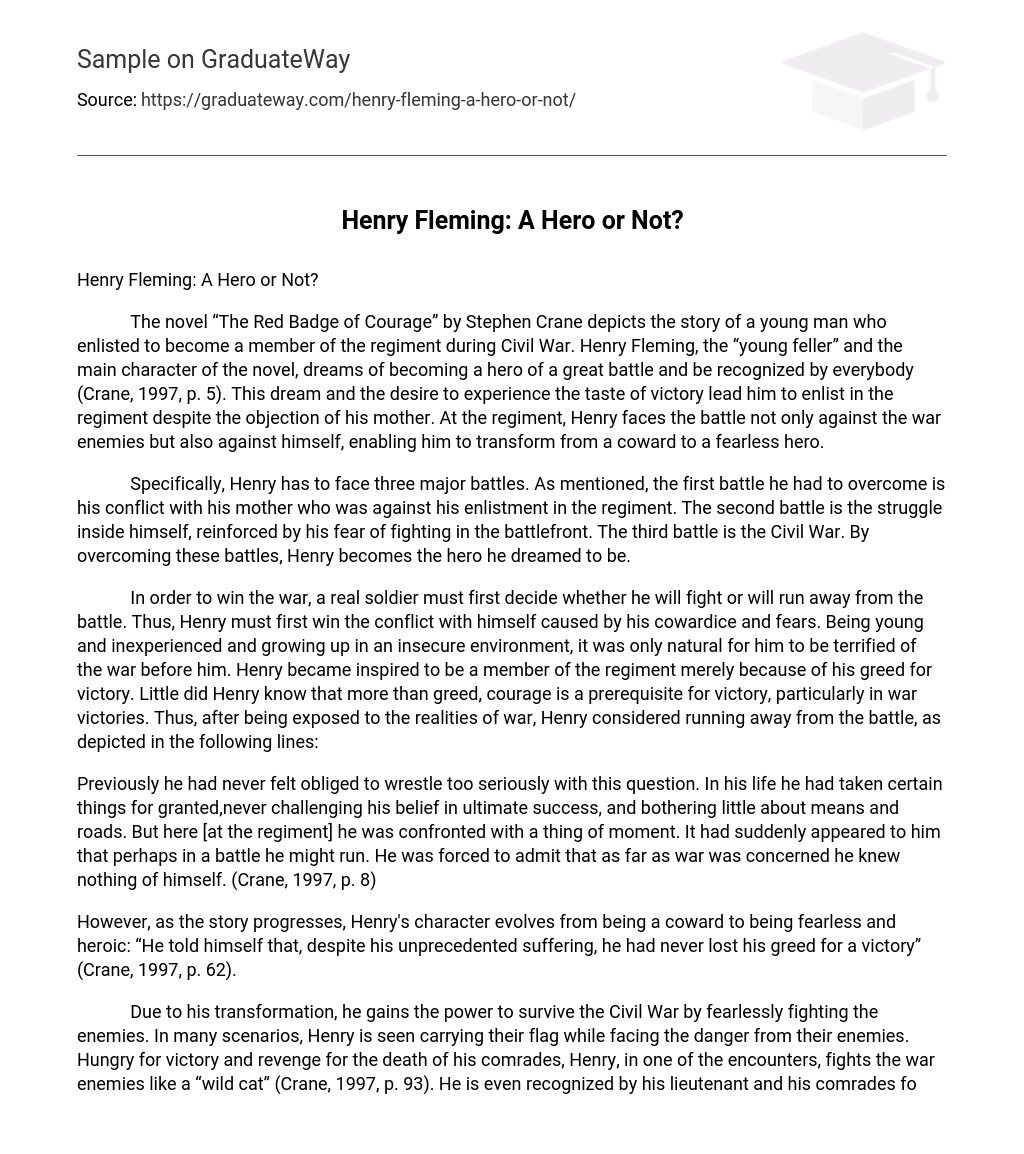The novel “The Red Badge of Courage” by Stephen Crane depicts the story of a young man who enlisted to become a member of the regiment during Civil War. Henry Fleming, the “young feller” and the main character of the novel, dreams of becoming a hero of a great battle and be recognized by everybody (Crane, 1997, p. 5). This dream and the desire to experience the taste of victory lead him to enlist in the regiment despite the objection of his mother. At the regiment, Henry faces the battle not only against the war enemies but also against himself, enabling him to transform from a coward to a fearless hero.
Specifically, Henry has to face three major battles. As mentioned, the first battle he had to overcome is his conflict with his mother who was against his enlistment in the regiment. The second battle is the struggle inside himself, reinforced by his fear of fighting in the battlefront. The third battle is the Civil War. By overcoming these battles, Henry becomes the hero he dreamed to be.
In order to win the war, a real soldier must first decide whether he will fight or will run away from the battle. Thus, Henry must first win the conflict with himself caused by his cowardice and fears. Being young and inexperienced and growing up in an insecure environment, it was only natural for him to be terrified of the war before him. Henry became inspired to be a member of the regiment merely because of his greed for victory. Little did Henry know that more than greed, courage is a prerequisite for victory, particularly in war victories. Thus, after being exposed to the realities of war, Henry considered running away from the battle, as depicted in the following lines:
Previously he had never felt obliged to wrestle too seriously with this question. In his life he had taken certain things for granted,never challenging his belief in ultimate success, and bothering little about means and roads. But here [at the regiment] he was confronted with a thing of moment. It had suddenly appeared to him that perhaps in a battle he might run. He was forced to admit that as far as war was concerned he knew nothing of himself. (Crane, 1997, p. 8)
However, as the story progresses, Henry’s character evolves from being a coward to being fearless and heroic: “He told himself that, despite his unprecedented suffering, he had never lost his greed for a victory” (Crane, 1997, p. 62).
Due to his transformation, he gains the power to survive the Civil War by fearlessly fighting the enemies. In many scenarios, Henry is seen carrying their flag while facing the danger from their enemies. Hungry for victory and revenge for the death of his comrades, Henry, in one of the encounters, fights the war enemies like a “wild cat” (Crane, 1997, p. 93). He is even recognized by his lieutenant and his comrades for dauntlessly fighting off the enemies. After the war, Henry becomes regarded as tremendous figure.
Although at first, Crane (1997) portrayed Henry as a coward, the transformation of his character brought by different events in the war field makes Henry a character of courage and bravery. He has undoubtedly surpassed the battle inside himself, which has given him the courage and strength to fight against their enemies: “By this struggle he had overcome obstacles which he had admitted to be mountains. They had fallen like paper peaks, and he was now what he called a hero” (Crane et al, 1997, p. 93). Then, by winning different battles and serving as leader of the regiment during the latter part of the story, Henry becomes a hero — a remarkably brave person.
The many lapses in Henry’s character only show that Stephen Crane employs realism and naturalism in the story — as a human, Henry is imperfect and has weaknesses. He may be coward at first, but through the many battles he overcame (battles with his mother, with himself, and during the Civil War), he was able to develop his courage and become a true soldier, a leader, and a hero as far as he and his comrades are concerned. As for me, becoming a hero does not necessarily mean than one must save the lives of other people and give honor to his state. Being hero simply means having the courage to face your fears and overcoming them. The red badge of Henry’s courage, gained from winning both internal (self) and external (state) battles, serves as his heroic medallion and recognition.
Work Cited
Crane, Stephen.” The Red Badge of Courage.” The Red Badge of Courage and Four Stories.
Ed. R.W. Stallman. New York, N.Y.: Penguin Group, 1997. 1–129.





